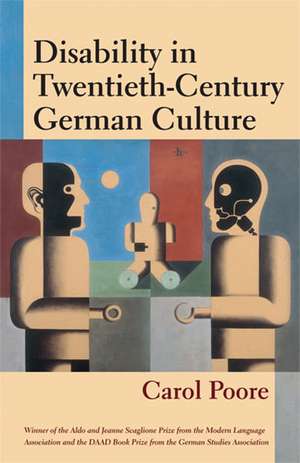Disability in Twentieth-Century German Culture: Corporealities: Discourses Of Disability
Autor Carol Pooreen Limba Engleză Paperback – iun 2009
"Comprehensively researched, abundantly illustrated and written in accessible and engaging prose . . . With great skill, Poore weaves diverse types of evidence, including historical sources, art, literature, journalism, film, philosophy, and personal narratives into a tapestry which illuminates the cultural, political, and economic processes responsible for the marginalization, stigmatization, even elimination, of disabled people---as well as their recent emancipation."
---Disability Studies Quarterly
"A major, long-awaited book. The chapter on Nazi images is brilliant---certainly the best that has been written in this arena by any scholar."
---Sander L. Gilman, Emory University
"An important and pathbreaking book . . . immensely interesting, it will appeal not only to students of twentieth-century Germany but to all those interested in the growing field of disability studies."
---Robert C. Holub, University of Tennessee
Disability in Twentieth-Century German Culture covers the entire scope of Germany's most tragic and tumultuous century---from the Weimar Republic to the current administration---revealing how central the notion of disability is to modern German cultural history. By examining a wide range of literary and visual depictions of disability, Carol Poore explores the contradictions of a nation renowned for its social services programs yet notorious for its history of compulsory sterilization and eugenic dogma. This comprehensive volume focuses particular attention on the horrors of the Nazi era, when those with disabilities were considered "unworthy of life," but also investigates other previously overlooked topics including the exile community's response to disability, socialism and disability in East Germany, current bioethical debates, and the rise and gains of Germany's disability rights movement.---Disability Studies Quarterly
"A major, long-awaited book. The chapter on Nazi images is brilliant---certainly the best that has been written in this arena by any scholar."
---Sander L. Gilman, Emory University
"An important and pathbreaking book . . . immensely interesting, it will appeal not only to students of twentieth-century Germany but to all those interested in the growing field of disability studies."
---Robert C. Holub, University of Tennessee
Richly illustrated, wide-ranging, and accessible, Disability in Twentieth-Century German Culture gives all those interested in disability studies, German studies, visual culture, Nazi history, and bioethics the opportunity to explore controversial questions of individuality, normalcy, citizenship, and morality. The book concludes with a memoir of the author's experiences in Germany as a person with a disability.
Carol Poore is Professor of German Studies at Brown University.
Illustration: "Monument to the Unknown Prostheses" by Heinrich Hoerle © 2007 Artists Rights Society (ARS), New York / VG Bild-Kunst, Bonn
A volume in the series Corporealities: Discourses of Disability
"Insightful and meticulously researched . . . Using disability as a concept, symbol, and lived experience, the author offers valuable new insights into Germany's political, economic, social, and cultural character . . . Demonstrating the significant ‘cultural phenomena' of disability prior to and long after Hitler's reign achieves several important theoretical and practical aims . . . Highly recommended."
---Choice
Din seria Corporealities: Discourses Of Disability
-
 Preț: 214.26 lei
Preț: 214.26 lei -
 Preț: 246.08 lei
Preț: 246.08 lei - 8%
 Preț: 466.57 lei
Preț: 466.57 lei -
 Preț: 236.41 lei
Preț: 236.41 lei -
 Preț: 170.78 lei
Preț: 170.78 lei -
 Preț: 195.99 lei
Preț: 195.99 lei -
 Preț: 198.89 lei
Preț: 198.89 lei -
 Preț: 233.13 lei
Preț: 233.13 lei -
 Preț: 251.95 lei
Preț: 251.95 lei -
 Preț: 203.66 lei
Preț: 203.66 lei -
 Preț: 189.14 lei
Preț: 189.14 lei -
 Preț: 274.83 lei
Preț: 274.83 lei -
 Preț: 275.22 lei
Preț: 275.22 lei -
 Preț: 272.17 lei
Preț: 272.17 lei - 19%
 Preț: 476.36 lei
Preț: 476.36 lei - 5%
 Preț: 192.95 lei
Preț: 192.95 lei -
 Preț: 236.90 lei
Preț: 236.90 lei -
 Preț: 212.88 lei
Preț: 212.88 lei -
 Preț: 203.99 lei
Preț: 203.99 lei -
 Preț: 170.64 lei
Preț: 170.64 lei -
 Preț: 201.27 lei
Preț: 201.27 lei -
 Preț: 260.05 lei
Preț: 260.05 lei -
 Preț: 201.36 lei
Preț: 201.36 lei -
 Preț: 238.43 lei
Preț: 238.43 lei - 19%
 Preț: 479.70 lei
Preț: 479.70 lei -
 Preț: 234.84 lei
Preț: 234.84 lei -
 Preț: 297.31 lei
Preț: 297.31 lei - 19%
 Preț: 420.98 lei
Preț: 420.98 lei - 19%
 Preț: 448.99 lei
Preț: 448.99 lei -
 Preț: 171.84 lei
Preț: 171.84 lei -
 Preț: 204.58 lei
Preț: 204.58 lei -
 Preț: 236.63 lei
Preț: 236.63 lei -

Preț: 191.45 lei
Nou
Puncte Express: 287
Preț estimativ în valută:
36.64€ • 39.17$ • 30.54£
36.64€ • 39.17$ • 30.54£
Carte indisponibilă temporar
Doresc să fiu notificat când acest titlu va fi disponibil:
Se trimite...
Preluare comenzi: 021 569.72.76
Specificații
ISBN-13: 9780472033812
ISBN-10: 0472033816
Pagini: 432
Ilustrații: 30 B&W photographs
Dimensiuni: 152 x 235 x 25 mm
Greutate: 0.73 kg
Editura: UNIVERSITY OF MICHIGAN PRESS
Colecția University of Michigan Press
Seria Corporealities: Discourses Of Disability
ISBN-10: 0472033816
Pagini: 432
Ilustrații: 30 B&W photographs
Dimensiuni: 152 x 235 x 25 mm
Greutate: 0.73 kg
Editura: UNIVERSITY OF MICHIGAN PRESS
Colecția University of Michigan Press
Seria Corporealities: Discourses Of Disability
Notă biografică
Carol Poore is Professor of German Studies at Brown University.
Descriere
A groundbreaking exploration of disability in Germany, from the Weimar Republic to present-day reunified Germany
